Bhubaneswar: Under the aegis of Odisha Development Initiative, more than 2600 delegates drawing representation from Civil Society Organizations (CSOs), government, academia, intelligentsia, PRI, and the media congregated at Bhubaneswar on 24th August, in a carnival like atmosphere, for a three-day Odisha Vikash (Development) Conclave-2018 (OVC) that which concluded on 26th of August 2018. Following intense deliberations, the participants delineated clear action agendas on 19 critical development issues and challenges of the state like tribal empowerment and development; women and violence; community rights over forest and community governance of commons; food and nutrition security; rain-fed agriculture; rural employment and migration; green skill and entrepreneurship development; school education and quality learning; health and wellness; drinking water, sanitation and hygiene; river ecology; inclusive governance, fiscal management and social accountability; democratizing urban governance; panchayati raj (local self-governance); towards resilient Odisha : disaster and climate change action; corporate sector in localizing SDGs; university community linkage; social exclusion and inequality; and child rights.
KEY RECOMMENDATIONS FROM THE CONCLAVE
- Enhance transparency and accountability in the local self-governance system through proper bottoms-up participatory planning, monitoring and implementation of welfare schemes and programs;
- Double the budget of MGNREGA and reach out at least 50% job card holders and ensure 100 days employment to 25% job card holders;
- Increase public spending on health to 2% of GSDP by next 3 years and regulate price, quality and access to health care in private sector; closely monitor the implementation of health insurance schemes;
- Invest on building human capital, through higher levels of resource commitment for social sectors, especially education;
- Promote rainfed farming systems including livestock and fishery in aspirational districts and develop Farmers Resource Centres that can act as convergence points for rainfed areas in all the districts;
- Enforce regulation on conservation of water and promote decentralized water supply systems rather than mega piped water supply systems;
- Formulate Odisha Migrant Workers Welfare board (OMWWB) and corpus fund for the welfare of vulnerable migrant workers in the state; strengthen interstate coordination and facilitation centres at both source and destination locations;
- While dealing with nutrition, follow a life cycle approach with a focus on
- first 1000 days, promote lactational management units, creche services for pre-school children and home visits at critical life stages;
- Activate Area Sabhas and Slum Improvement/Welfare Boards in urban areas;
- Ensure 100% RtE compliance in schools by next Academic Year;
- Ask for adequate budgetary allocations for proper curricular and co-curricular activities through well-defined School Development Plans (SDPs);
- Re-activate the regional imbalance commission to address inequality; take block as the lowest possible unit; bring the State Finance Commission around to prioritising the backward rural and urban local bodies that are plagued with gross inequality;
- Universalize social security pension and fix it at a minimum of the half of minimum wages per month; go for 5% reservation of PwDs in the local self-governance system;
- Include the third gender in all facilities, rights and entitlements;
- Prepare and empower communities to undertake local Hazard-Risk-Vulnerability (HRV) analysis; factor the risks and remedial measures in GP plans and allocate resources accordingly;
- Restrict the transfer of patta land of tribals to non-tribals;
- Formulate and implement an Inclusive River Policy and set-up a River Science Institute to promote research, advocacy and model for effective management of river basins;
 The proposals of all the 19 thematic tracks shall be complied and submitted to the State and Central Governments, for necessary and timely action, said Jagadananda, Convener of the Odisha Development Initiative.
The proposals of all the 19 thematic tracks shall be complied and submitted to the State and Central Governments, for necessary and timely action, said Jagadananda, Convener of the Odisha Development Initiative.
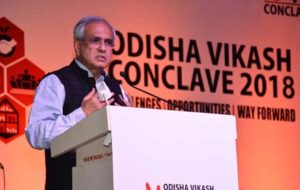 Dr. Rajiv Kumar, Vice-Chairperson, Niti Ayog; and Shri Dharmendra Pradhan, Union Cabinet Minister (Petroleum and Natural Gas and Skill Development and Entrepreneurship) Government of India, who both graced the inaugural ceremony as guests of honor promised that the proposals emerging from the Conclave would be seriously considered by the Union Government through a process of inter-ministerial consultation at the national level.
Dr. Rajiv Kumar, Vice-Chairperson, Niti Ayog; and Shri Dharmendra Pradhan, Union Cabinet Minister (Petroleum and Natural Gas and Skill Development and Entrepreneurship) Government of India, who both graced the inaugural ceremony as guests of honor promised that the proposals emerging from the Conclave would be seriously considered by the Union Government through a process of inter-ministerial consultation at the national level.
Gracing the valedictory session, the State Food Supplies and Consumer Welfare and Cooperation Minister Shri Surya Narayan Patro affirmed his commitment to convey the various proposals emerging from the Conclave to his State government and initiate swift action on the same. He also promised to ensure that the conclave’s recommendations got included in the election manifesto of their party.
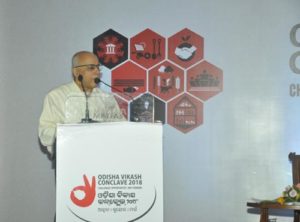 Dr. Subrato Bagchi, Chairman, Odisha Skill Development Authority (OSDA) emphasized the need for improved governance and accountability at the grassroots level. While Prof. H.K Senapati, Dircetor, NCERT laid emphasis on intensification of training of teachers for quality school education, Prof Srikant Mohapatra, Vice Chancellor, Odisha Open University concluded that the conclave has created a wonderful opportunity for linking the academic bodies of higher learning with the aspirations of the community.
Dr. Subrato Bagchi, Chairman, Odisha Skill Development Authority (OSDA) emphasized the need for improved governance and accountability at the grassroots level. While Prof. H.K Senapati, Dircetor, NCERT laid emphasis on intensification of training of teachers for quality school education, Prof Srikant Mohapatra, Vice Chancellor, Odisha Open University concluded that the conclave has created a wonderful opportunity for linking the academic bodies of higher learning with the aspirations of the community.
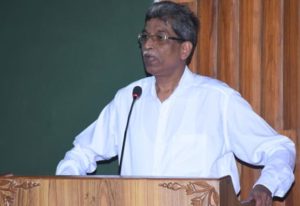 The event was organized collectively by more than 65 organizations known for their work at the local, national and global levels. Presence of key international development agencies and corporate bodies enriched the profile and dialogues of the Conclave. Many leading donors like UNICEF, WFP, PCI, Ajim Premji Philanthropic Initiative (APPI) and key development leaders from India and abroad deliberated upon and chalked out strategies as to how to localize the Sustainable
The event was organized collectively by more than 65 organizations known for their work at the local, national and global levels. Presence of key international development agencies and corporate bodies enriched the profile and dialogues of the Conclave. Many leading donors like UNICEF, WFP, PCI, Ajim Premji Philanthropic Initiative (APPI) and key development leaders from India and abroad deliberated upon and chalked out strategies as to how to localize the Sustainable 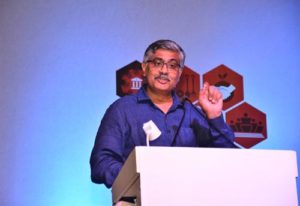 Development Goals (SDGs) in the specific context of Odisha. Among others dignitaries who addressed the gatherings were Parliamentarians Soumya Ranjan Pattnaik and Pinaki Mishra; the Chairperson of the State Food Commission, the Development Commissioner of Odisha; the Mission Director, National Nutrition Mission; and Officials from University Grants Commission, Government of India.
Development Goals (SDGs) in the specific context of Odisha. Among others dignitaries who addressed the gatherings were Parliamentarians Soumya Ranjan Pattnaik and Pinaki Mishra; the Chairperson of the State Food Commission, the Development Commissioner of Odisha; the Mission Director, National Nutrition Mission; and Officials from University Grants Commission, Government of India.
- 2670 representatives and 65 organizations participated and shared development plans on 19 thematic areas;
- NITI Aayog assured to consider the proposals from the Conclave through a process of inter-ministerial consultation.
- Odisha’s Development Commissioner promised to hold periodic dialogues on the Conclave recommendations;
- State Minister promised inclusion of OVC recommendations in election manifesto of their political party.
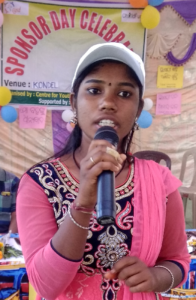 With much hardship Laxmi Talia, 19 years, could manage to complete her secondary level education in nearby college with the support of CYSD’s Child Development Project. Laxmi belongs to Maheswarpur village from Korukonda Block of Malkangiri District. To become a good student was not her prime intention; she rather wanted to “live and let others live”.
With much hardship Laxmi Talia, 19 years, could manage to complete her secondary level education in nearby college with the support of CYSD’s Child Development Project. Laxmi belongs to Maheswarpur village from Korukonda Block of Malkangiri District. To become a good student was not her prime intention; she rather wanted to “live and let others live”.
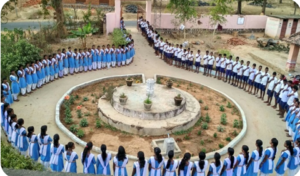 Padiabeda Upper Primary School of Thakurmunda block, the operational area of CYSD, sets an example in terms of cent percent students’ enrolment; their retention till completion of elementary education; monitoring of school activities; and preparation and implementation of school development plan. This is possible only due to the active functioning of its School Management Committee (SMC) and adherence to the RTE (Right To Education) norms. The school experiences changes in education standards through genuine community participation, especially the parents.
Padiabeda Upper Primary School of Thakurmunda block, the operational area of CYSD, sets an example in terms of cent percent students’ enrolment; their retention till completion of elementary education; monitoring of school activities; and preparation and implementation of school development plan. This is possible only due to the active functioning of its School Management Committee (SMC) and adherence to the RTE (Right To Education) norms. The school experiences changes in education standards through genuine community participation, especially the parents.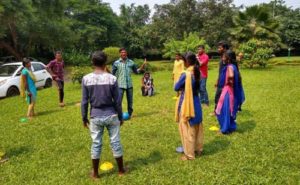 Young minds play a very crucial role in visualizing as well as achieving the SDGs of 2030. Over one third of the 169 SDGs targets highlight the role of young people and the importance of their empowerment, participation, and well-being in materializing SDGs in true sense (UNDP, 2017). Most young people are optimistic about the future. A Youth Speak global survey states that 68% of the young people believe the world will be a better place by 2030. This marks the evidence to realize the importance of Youth participation in realizing SDG by 2030. In this context, CYSD is motivated to engage young minds across the globe in conceptualizing the context of SDGs from local levels and at the same time orient them to become the future change agents of the society and advocate for social inclusion in the community and local governance.
Young minds play a very crucial role in visualizing as well as achieving the SDGs of 2030. Over one third of the 169 SDGs targets highlight the role of young people and the importance of their empowerment, participation, and well-being in materializing SDGs in true sense (UNDP, 2017). Most young people are optimistic about the future. A Youth Speak global survey states that 68% of the young people believe the world will be a better place by 2030. This marks the evidence to realize the importance of Youth participation in realizing SDG by 2030. In this context, CYSD is motivated to engage young minds across the globe in conceptualizing the context of SDGs from local levels and at the same time orient them to become the future change agents of the society and advocate for social inclusion in the community and local governance.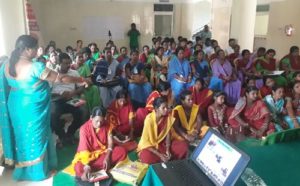 Keeping in view the above, CYSD has recently launched, an innovative Project ‘Samvad’ – Digital Community Engagement Platform for Improving Maternal Child Health and Nutrition Outcomes supported by Digital Green. The project is being implemented in 150 villages covering 23000 women in Jashipur, Thakurmunda and Saharapada blocks under Mayurbhanja and Keonjhar district respectively. The aims of the Project “Samvad”- is to create demand and enabling environments for adoption of practices that are critical for improvements in planned family and nutrition outcomes by integrating behavior change communication regarding nutrition-specific interventions with nutrition-sensitive approaches (including use of health and other safety net services and hygiene practices).
Keeping in view the above, CYSD has recently launched, an innovative Project ‘Samvad’ – Digital Community Engagement Platform for Improving Maternal Child Health and Nutrition Outcomes supported by Digital Green. The project is being implemented in 150 villages covering 23000 women in Jashipur, Thakurmunda and Saharapada blocks under Mayurbhanja and Keonjhar district respectively. The aims of the Project “Samvad”- is to create demand and enabling environments for adoption of practices that are critical for improvements in planned family and nutrition outcomes by integrating behavior change communication regarding nutrition-specific interventions with nutrition-sensitive approaches (including use of health and other safety net services and hygiene practices). The proposals of all the 19 thematic tracks shall be complied and submitted to the State and Central Governments, for necessary and timely action, said Jagadananda, Convener of the Odisha Development Initiative.
The proposals of all the 19 thematic tracks shall be complied and submitted to the State and Central Governments, for necessary and timely action, said Jagadananda, Convener of the Odisha Development Initiative. Dr. Rajiv Kumar, Vice-Chairperson, Niti Ayog; and Shri Dharmendra Pradhan, Union Cabinet Minister (Petroleum and Natural Gas and Skill Development and Entrepreneurship) Government of India, who both graced the inaugural ceremony as guests of honor promised that the proposals emerging from the Conclave would be seriously considered by the Union Government through a process of inter-ministerial consultation at the national level.
Dr. Rajiv Kumar, Vice-Chairperson, Niti Ayog; and Shri Dharmendra Pradhan, Union Cabinet Minister (Petroleum and Natural Gas and Skill Development and Entrepreneurship) Government of India, who both graced the inaugural ceremony as guests of honor promised that the proposals emerging from the Conclave would be seriously considered by the Union Government through a process of inter-ministerial consultation at the national level. Dr. Subrato Bagchi, Chairman, Odisha Skill Development Authority (OSDA) emphasized the need for improved governance and accountability at the grassroots level. While Prof. H.K Senapati, Dircetor, NCERT laid emphasis on intensification of training of teachers for quality school education, Prof Srikant Mohapatra, Vice Chancellor, Odisha Open University concluded that the conclave has created a wonderful opportunity for linking the academic bodies of higher learning with the aspirations of the community.
Dr. Subrato Bagchi, Chairman, Odisha Skill Development Authority (OSDA) emphasized the need for improved governance and accountability at the grassroots level. While Prof. H.K Senapati, Dircetor, NCERT laid emphasis on intensification of training of teachers for quality school education, Prof Srikant Mohapatra, Vice Chancellor, Odisha Open University concluded that the conclave has created a wonderful opportunity for linking the academic bodies of higher learning with the aspirations of the community. The event was organized collectively by more than 65 organizations known for their work at the local, national and global levels. Presence of key international development agencies and corporate bodies enriched the profile and dialogues of the Conclave. Many leading donors like UNICEF, WFP, PCI, Ajim Premji Philanthropic Initiative (APPI) and key development leaders from India and abroad deliberated upon and chalked out strategies as to how to localize the Sustainable
The event was organized collectively by more than 65 organizations known for their work at the local, national and global levels. Presence of key international development agencies and corporate bodies enriched the profile and dialogues of the Conclave. Many leading donors like UNICEF, WFP, PCI, Ajim Premji Philanthropic Initiative (APPI) and key development leaders from India and abroad deliberated upon and chalked out strategies as to how to localize the Sustainable  Development Goals (SDGs) in the specific context of Odisha. Among others dignitaries who addressed the gatherings were Parliamentarians Soumya Ranjan Pattnaik and Pinaki Mishra; the Chairperson of the State Food Commission, the Development Commissioner of Odisha; the Mission Director, National Nutrition Mission; and Officials from University Grants Commission, Government of India.
Development Goals (SDGs) in the specific context of Odisha. Among others dignitaries who addressed the gatherings were Parliamentarians Soumya Ranjan Pattnaik and Pinaki Mishra; the Chairperson of the State Food Commission, the Development Commissioner of Odisha; the Mission Director, National Nutrition Mission; and Officials from University Grants Commission, Government of India.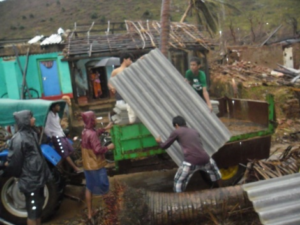 A severe cyclonic storm “Phailin” with wind speed of more than 220 km per hour struck Odisha on 12th October 2013 resulting in massive devastation and severe floods in many districts. Incessant rain followed the cyclone brought floods in two phases. Ganjam and Puri are the worst affected districts due to Phailin. 59 persons died in Cyclone and flood that affected half of the state’s 4.19 crore population spread over 18 districts as per the official figure. Standing crops over nearly 11 lakh hector have been destroyed. Over 8 lakh houses were damaged in nearly 22000 villages while 2000 livestock perished. while Power installations worth about 12000 crores got damaged. Nearly four lakh (400000) electric poles uprooted alone in Ganjam district.
A severe cyclonic storm “Phailin” with wind speed of more than 220 km per hour struck Odisha on 12th October 2013 resulting in massive devastation and severe floods in many districts. Incessant rain followed the cyclone brought floods in two phases. Ganjam and Puri are the worst affected districts due to Phailin. 59 persons died in Cyclone and flood that affected half of the state’s 4.19 crore population spread over 18 districts as per the official figure. Standing crops over nearly 11 lakh hector have been destroyed. Over 8 lakh houses were damaged in nearly 22000 villages while 2000 livestock perished. while Power installations worth about 12000 crores got damaged. Nearly four lakh (400000) electric poles uprooted alone in Ganjam district.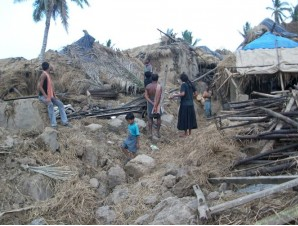 Immediately CYSD set up a forum called Odisha Phailin Response Forum (OPRF) an alliance of civil society organizations for Phailin response. CYSD in collaboration with local NGO partners undertook the activities to respond to the immediate needs of the people.
Immediately CYSD set up a forum called Odisha Phailin Response Forum (OPRF) an alliance of civil society organizations for Phailin response. CYSD in collaboration with local NGO partners undertook the activities to respond to the immediate needs of the people.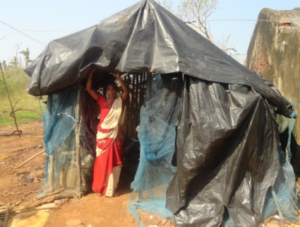 Odisha has always been a victim of disasters. Apart from natural disasters such as floods and cyclones, persistent droughts also affect the interiors of the state. CYSD’s new strategic plan calls for strategic interventions and initiatives for strengthening disaster response both in the civil society space and across other sectors. Accordingly the disaster response and mitigation unit is in place to
Odisha has always been a victim of disasters. Apart from natural disasters such as floods and cyclones, persistent droughts also affect the interiors of the state. CYSD’s new strategic plan calls for strategic interventions and initiatives for strengthening disaster response both in the civil society space and across other sectors. Accordingly the disaster response and mitigation unit is in place to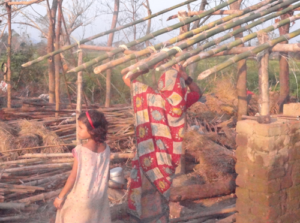 Odisha witnessed a severe spate of floods in 2006 affecting 12 districts with a loss of 22 lives. The worst hit district was Kendrapara with a total 4, 98,854 people affected in 612 villages. Sustained water logging posed a serious threat on an epidemic with no access to basic human health services and safe drinking water, and livestock were stranded with little or no access to water, fodder, and veterinary medicines.
Odisha witnessed a severe spate of floods in 2006 affecting 12 districts with a loss of 22 lives. The worst hit district was Kendrapara with a total 4, 98,854 people affected in 612 villages. Sustained water logging posed a serious threat on an epidemic with no access to basic human health services and safe drinking water, and livestock were stranded with little or no access to water, fodder, and veterinary medicines.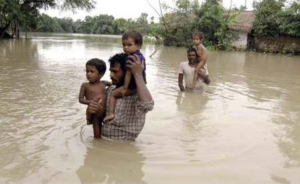 The state witnessed severe floods caused by unusually heavy rains in 2001 and 2003 affecting many districts of Odisha. The affected villages were cut up from main cities, the flooding damage to property, destruction of crops, and loss of livestock, deterioration of health conditions owing to waterborne diseases.
The state witnessed severe floods caused by unusually heavy rains in 2001 and 2003 affecting many districts of Odisha. The affected villages were cut up from main cities, the flooding damage to property, destruction of crops, and loss of livestock, deterioration of health conditions owing to waterborne diseases.